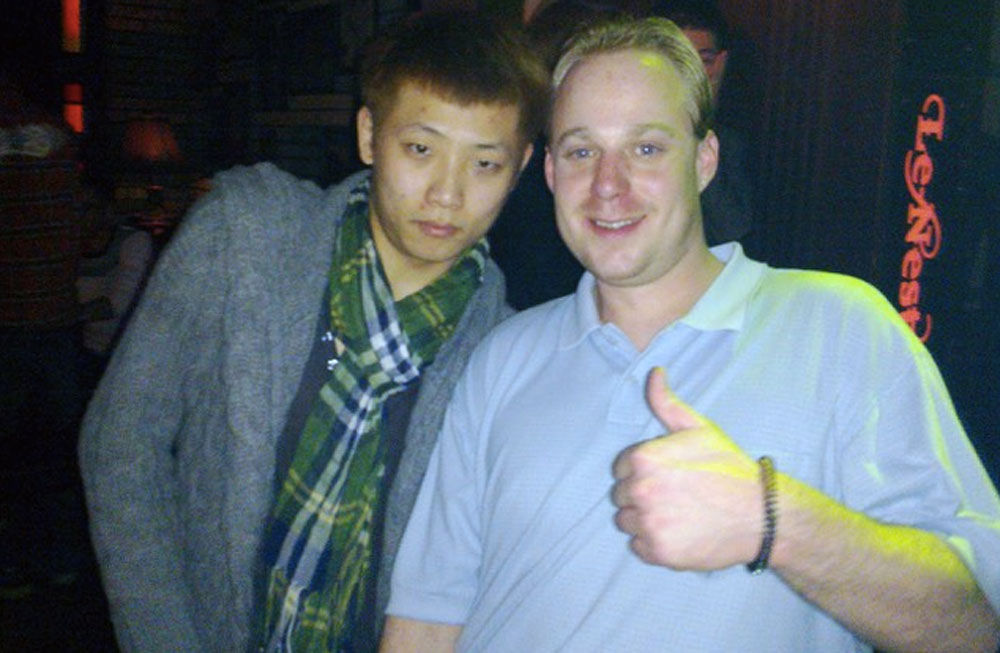It looked like a happy gathering.
In March of 2016, dozens of people arrived at a pizza shop in Shenzhen where a sign pasted onto a glass pizza display read: ‘Thirty percent of proceeds will be donated to Sean Hammond.’ Hammond had died suddenly and the money would go to sending his remains back to New Jersey, with anything extra raised going to his orphaned daughter.
Billboard 100 hits played as pictures of Hammond were projected on a wall and friends stood to speak, describing him as a great – if challenging – friend.
“This is how we met,” a man said before opening a bottle of 35-proof liquor and finishing it in a series of gulps.
A suited host urged attendees to buy food and alcohol in Hammond’s memory and a woman put down a margarita before picking up the microphone: “I have some words to say. Bear with me, I’ll say them, then we can all drink.”
It had been six days since Hammond drank himself to death.

Medically speaking, Hammond died from cardiac arrest. It came as a shock to his friends, though many ‘saw it coming’ after the fact. Hammond struggled with alcohol for years, earning ‘frequent flyer’ status at hospitals, where doctors knew to treat him for alcohol poisoning on sight. Although many of his friends liked to drink, Hammond would take it too far, drinking for weeks at a time and having at least one bender that left him unable to shower on his own.
His death wasn’t one night in the making and just because the road to his passing had been set, didn’t mean it had to happen.
“He was really a very persuasive, good looking guy. He was really a master salesperson”
It took a predisposition to drink as much as it took a blind-eye culture and a language barrier preventing close friendships with locals. As much a victim of his vices, Hammond was a victim to the expat way of life.
“The first two years I was here, I drank every day to the point of being drunk,” says 5-year Shenzhen resident Donald Heiman, who asked not to use his real name. “All the other expats were drinking. It was just the thing to do.”
Heiman’s story is a familiar one. Unable to speak Chinese, he formed a motley crew of friends who had little in common outside of a fondness to imbibe.
“When you get here, if you want to go out and socialize, you’re going to go and find people at the bar,” says Heiman.
In 2014, the World Health Organization estimated that 3.3 million deaths each year could be traced to ‘harmful use of alcohol,’ a rather broad brush to paint the potential problem, but studies on expatriate alcohol use are few and far between.
The little research done confirms what many expect. A study hosted by the US National Library of Medicine found an increase in drinking in Americans living abroad, with alcohol use increasing markedly among those who don’t integrate into the host culture. As welcoming as China is, laowai remain laowai.
“The big difference for me was that I learned Chinese,” Heiman says. “After changing my social circle, I drank a lot less.”
Rated as one of the most difficult languages in the world, learning Chinese requires 2,200 hours of academic masochism for native English speakers to hit ‘general proficiency.’ Most choose a relaxing night out over cloistered study.
“He was really a very persuasive, good looking guy. He was really a master salesperson,” says businessman James Sung. Sung convinced Hammond to come to China in 2010 with an eye towards working together.
“There was a book, and it was such an appropriate title that I had to send it to him,” says Sung. “It was called Struggling in America? Come to China.”
Hammond, a single father with a tumultuous family life, did what many alcoholics do when problems stack up: he tried to lose them in another country.
“I did what we call a geographical,” says S., explaining a move common enough among alcoholics to have its own parlance.
Now sober, S. has been attending Alcoholics Anonymous meetings in Shenzhen for around 11 years, serving as the organizer for much of that time.
“In China they think alcoholism is a moral dilemma,” says S. “If you have a family member with it, you lock them in the basement and don’t talk about it.”
Lacking even a family with a basement, Hammond’s problems worsened. A few days after arriving in China, Sung recalls finding his friend sitting on steps outside drinking from a bottle of Jack Daniels.
“If a job takes someone away from supportive scrutiny and people calling them to account, then chances are they will do something they shouldn’t”
“He knew he had a problem and he would try to control it,” says Sung, who sent Hammond to the hospital for alcohol poisoning at least six times by his count. “There was a stretch with no problems with him for a long time, and then these coworkers at a company wanted to go out and drink.”
It would have been difficult for Hammond to say no. In China, the pressure to drink can be extreme, with news of untimely deaths a regular media feature.
In 2016, a Hainan bridesmaid was filmed surrounded by people goading her into finishing glasses of high-proof booze until she collapsed. She later choked to death on her vomit. The same year, Anhui Province decided to issue an almost total ban on consuming at official functions after a spate of alcohol-related civil servant deaths.
A recent story to make the media rounds comes from Jiangsu province, where a postgraduate student who rarely drank collapsed and died after reportedly being pressured to drink by his superior.
“It has to do with giving people face, people just don’t accept you not having a drink with them,” Sung says.
Dr. Seamus MacAuley has worked in addiction treatment for 12 years and is now the head counselor at Hong Kong’s The Cabin, a chain of treatment centers with branches ranging from Thailand to Denmark.
“If a job takes someone away from supportive scrutiny and people calling them to account, then chances are they will do something they shouldn’t,” says MacAuley, who estimates that 25 percent of Hong Kong’s expatriates abuse alcohol, 9 percent more than drink ‘at hazardous levels’ in England.

According to a Nanshan People’s Hospital information officer, Hammond sought treatment for alcohol poisoning the day he died, yet his death certificate doesn’t mention it. And that’s normal.
“Of course it says cardiac arrest, but the underlying problem is alcohol. You very rarely will see anything on a death certificate related to alcohol. It usually reads liver failure, cardiac failure,” says MacAuley.
Sitting in his humble apartment in Shenzhen’s affluent Software Park area, Sung replays Hammond’s last WeChat voice messages from an iPhone 7 Plus. They range from threats, to business ideas to a plea for help 10 days before his death.
“I didn’t think anything was wrong. It was so normal,” says Sung, who had been traveling at the time. “It still haunts me.”
After Hammond’s death, Sung spearheaded the fundraising effort to return Hammond’s remains to the United States. It was a stunning success.
Characterized by one long-term expat as ‘there but for the grace of God I go,’ it raised USD10,000, including donations from people in Beijing, Shanghai and Taiwan who had never met Hammond.
Asked if Hammond’s death was inevitable, Sung pauses before answering.
“On his path, I guess eventually,” he says “But really… I think (being in) China definitely sped up the process.”
If you or someone you know is struggling with alcohol, you can find help here:
AAShenzhen.com and AAGuangzhou.com
[Images via Onemanswarblog.com, James Sung]





















0 User Comments